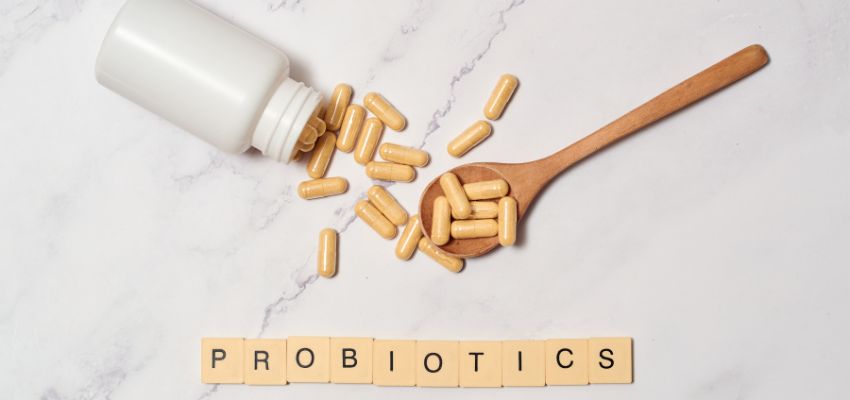Can You Take Probiotics While Pregnant: A Guide For Expecting Moms

Published January 8, 2025
Pregnancy is an exciting journey, but it has its challenges. As your body changes, health risks can increase, and finding safe treatments may feel overwhelming. Many medications warn of potential harm to your baby, leading mothers to look for safer options. This is where probiotics come in—but are they safe during pregnancy?
In this article, we’ll explore an important question: Can you take probiotics while pregnant? We’ll also tackle the potential benefits and risks of probiotic use during pregnancy and recommend safe and effective use.
What Are Probiotics?
Probiotics are often called “good” or “beneficial” bacteria. They are living microorganisms that provide health benefits. Our bodies host billions of microorganisms, known as the microbiome. Some of these microorganisms are harmful, while others are helpful. Keeping the right balance is critical to staying healthy.
Probiotics help maintain balance in the body. They prevent detrimental bacteria from taking over and causing illness. While probiotics are best known for supporting gut health, their benefits extend beyond digestion. Probiotics promote healthy, radiant skin and strengthen the immune system. Probiotics benefit nearly every part of the body.
In addition to being naturally present in our microbiome, probiotics can be obtained through certain foods. Fermented items like yogurt, kimchi, and sauerkraut are excellent natural sources. For faster or more targeted results, try probiotic supplements. Options like Bionaze are highly effective. Adding probiotics to your routine is simple. It’s a powerful way to boost your health and well-being.
In the following section, we’ll explore an important question in greater detail: can you take probiotics while pregnant?

Are Probiotics Safe During Pregnancy?
Yes, probiotics are safe for pregnant women and are often recommended. Solid science backs this up.
Probiotics are generally considered safe for most individuals, including those who are pregnant or breastfeeding. Clinical studies show that probiotics are rarely absorbed systemically in healthy people, reducing the likelihood of them passing into breast milk or affecting pregnancy or lactation. Using probiotics while breastfeeding is unlikely to pose any risk, as they don’t typically enter the fetal circulation or impact the developing baby.
A study found that probiotic supplements during pregnancy and lactation can benefit infants. They may help colonize the infant gut and breast milk microbiota.
A 2009 review of controlled trials concluded that probiotics are safe during pregnancy. The findings revealed no increased risk of miscarriage, no influence on C-section rates, and no adverse effects on birth weight or gestational age.
The Benefits Of Probiotics For Pregnant Women
There’s an old saying that a pregnant woman always has one foot in the grave. It reflects the many risks that can occur during pregnancy—these range from common issues like heartburn, acidity, and constipation. More severe concerns include miscarriages, preterm birth, and gestational diabetes.
Here are additional ways probiotics can benefit women during pregnancy:
Reduced Heartburn And Acid Reflux
Heartburn and acid reflux are often confused but aren’t the same. Acid reflux is a condition that triggers heartburn, a burning sensation in the chest. It can feel like a heart attack, but it’s not related to the heart.
During pregnancy, the hormone progesterone increases. This causes muscle tissues, including the valve between the stomach and esophagus, to relax. When the valve doesn’t close properly, stomach acid flows back into the esophagus, leading to acid reflux and heartburn discomfort.
Antacids are effective in relieving heartburn. However, they’re rarely prescribed for pregnant women. Instead, probiotics have emerged as a helpful alternative. Research suggests combining probiotics with antacids may significantly relieve acid reflux. Probiotics are a safe and effective way to manage these symptoms during pregnancy.
Support A Healthy Digestive System During Pregnancy
Pregnancy often comes with gastrointestinal challenges. These can include constipation, nausea, vomiting, and gallstones. These issues are mainly due to hormonal changes that can disrupt your digestive system.
The addition of probiotics to your diet supports a healthy gut. This helps maintain an ideal gut flora balance, reducing the likelihood of these problems for improved gastrointestinal function. Foods like kimchi, sauerkraut, and yogurt are excellent sources of probiotics, promoting overall digestive health.
However, if you have gallstones, it’s best to avoid yogurt, as dairy products can sometimes trigger gallbladder pain. Probiotics are a powerful ally during pregnancy. They help keep your stomach and intestines healthy.
Lower Risk Of Vaginal Infection
Pregnancy causes hormonal changes. These changes can raise the risk of vaginal infections like bacterial vaginosis. These infections can be uncomfortable, causing itchiness and unpleasant odors.
Probiotics can help reduce this risk by supporting your body’s natural defenses. They promote the growth of “good bacteria” to fight harmful bacteria. This helps prevent infections and improves vaginal health.
Lesser Risk Of Miscarriage
Infections are a leading cause of miscarriage. Pregnant women are especially vulnerable to vaginal infections. A study highlights the high risk of miscarriage from infections during pregnancy. These include bacterial vaginosis, gonorrhea, brucellosis, listeriosis, syphilis, HIV, CMV, and rubella.
Probiotics support healthier microbiomes. This can help prevent infections and reduce the risk of pregnancy loss.
Prevents Gestational Diabetes
Preventing gestational diabetes is vital for the health of both expecting mothers and their babies. This condition can have profound effects. It may cause the baby to grow larger than average. This can lead to delivery complications, such as birth injuries.
Research on probiotics and gestational diabetes is limited. However, many studies suggest that probiotics may reduce the risk of this condition. Including probiotics in your diet may be beneficial for a healthier pregnancy.
Reduced Risk Of Preterm Birth And Other Complications
Preterm birth stands out as one of the most severe complications during pregnancy.
Preterm birth (PTB) poses serious health risks for babies. Their development may be incomplete, making them more vulnerable to complications. Many factors can cause PTB, but infection and inflammation are top contributors. Research shows that women with bacterial vaginosis have a higher risk of preterm birth.
A study found that probiotics significantly reduced the risk of death in women. They also lowered the risk of necrotizing fasciitis, a rare but life-threatening infection during pregnancy.
Helps Prevent Eczema In Babies
Probiotics aren’t just beneficial for your skin—they can also play a key role in infant health. For pregnant women, studies have shown that probiotics may help prevent eczema in their babies.
Frequently Asked Questions
How common is probiotic use during pregnancy?
More women are using probiotics during pregnancy. Probiotics help improve gut health and address issues like constipation and diarrhea.
Why are certain probiotic strains more important during pregnancy?
Probiotics include different types of bacteria and microbes, each with unique benefits. Some strains have been studied more for pregnancy, while others are still found in the gut, pregnant or not. Scientists believe these microbes are not exclusive to the large intestine during pregnancy.
What are the best probiotics for pregnancy?
The best probiotics for pregnancy include strains like Lactobacillus rhamnosus HN001, Lactobacillus acidophilus, and Lactobacillus reuteri. These can be found in supplements designed for expectant mothers or in foods like yogurt, sauerkraut, and kimchi. Always consult your doctor before trying out a probiotic supplement during pregnancy.
Why Choose Bionaze?
Expectant mothers know the importance of staying healthy. Taking care of themselves and their baby is a top priority during pregnancy. Bionaze, a premium oral probiotic, offers an excellent way to support overall health throughout this particular time.
Bionaze is made with advanced probiotic strains BLIS K12 and BL-04. It helps maintain healthy bacteria in your sinuses, ears, nose, mouth, and throat. These strains offer many benefits. They relieve post-nasal drip, reduce phlegm, and fight bad breath by targeting harmful bacteria. BLIS K12 also supports the immune system, which is especially important during pregnancy.
Bionaze helps you stay well during this transformative journey by promoting respiratory health and encouraging bacterial balance. While pregnancy comes with its challenges, Bionaze is here to help you feel your best every step of the way. Support your health with Bionaze and embrace a healthier, more confident pregnancy.

Embrace A Healthy Pregnancy With Probiotics
Pregnancy is a time of profound change and growth for you and your baby. Many expectant mothers wonder, “Can you take probiotics while pregnant?” Incorporating probiotics into your routine can offer benefits like better digestion and fewer complications. However, it’s important to be aware of potential challenges. Always consult your healthcare provider to determine if probiotics are right for you and to choose the best options for your needs. This ensures a safe and healthy pregnancy. With the proper care and support, you can embrace this transformative journey with confidence and well-being.
Benefit From The Latest Advancements In Probiotic Science With Bionaze
Bionaze is a proprietary blend of probiotics proven to promote ear, nose, and throat health, improve digestion, and support your immune system. The active ingredients BLIS K12, and BL-04 are considered among the best probiotics according to science.
Get 25% Off Your First Order when you use BIO25 at checkout!

This Content Has Been Reviewed For Factual Accuracy
This content has undergone thorough fact-checking by our team of internal experts. Learn more about the meticulous editorial standard for our website here.
ADVERTISEMENT

About The Author
Hi, I’m Corinne Grace, a proud nursing graduate from Riverside College with a flair for writing. I specialize in health and wellness topics, using my educational background to weave informative and attention-grabbing articles that appeal to a wide variety of readers.




